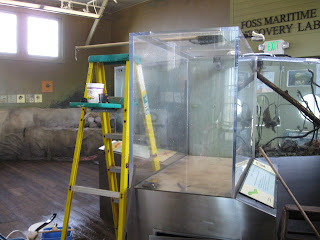
 Even though it gray and rainy outside some exciting things are still happening at PTMSC. Chrissy was teaching a NOLS class on the dock when they pulled up these two amazing critters! A Pacific Spiny Lumpsucker and a Winged Sea Slug!
Even though it gray and rainy outside some exciting things are still happening at PTMSC. Chrissy was teaching a NOLS class on the dock when they pulled up these two amazing critters! A Pacific Spiny Lumpsucker and a Winged Sea Slug! Have you ever walked down the beach and all of this foam is all over the beach? I have always wondered what it was and now I know!!
Have you ever walked down the beach and all of this foam is all over the beach? I have always wondered what it was and now I know!! 
 Akashiwo sanguinea (from our Sound Toxins lab) A beached loon with foam (Picture from National Geographic)
Akashiwo sanguinea (from our Sound Toxins lab) A beached loon with foam (Picture from National Geographic)
photo by: David Plude
 The final step in making the mold requires one volunteer to place a firm and steady finger on the very tip of the tooth, while another volunteer gently pours the "mold goop" until the tooth is completely submerged.
The final step in making the mold requires one volunteer to place a firm and steady finger on the very tip of the tooth, while another volunteer gently pours the "mold goop" until the tooth is completely submerged.
photo by: David Plude
By the time we reached the next step we had an article in the local paper and had become professional mold makers! Step 2-Teeth casting. Once our molds had set for the required 24 hour period we began the task of removing the teeth from the molds. Once teeth were removed we put on our mad scientist gear (goggles and gloves of course) and headed outside. The chemicals being used to create our casts were toxic and ventilation was a must!

 photos by: Nathan Trimble
photos by: Nathan Trimble Lucky for us the epoxy used for casting only needed to sit for 30 minutes. It was great to see the results of our work so quickly. Every single mold created nearly identical casts! Results prove what great volunteers we had this week at the workshop.
By Friday we reached our final step. Step 3- Teeth painting. Painting teeth was a change of pace from the rest of the week. It allowed us to express ourselves artistically and also just enjoy talking with one another around the table.

By the end of the afternoon session Friday we had created 46 false teeth for "Our Orca". The work done this week was flawless! Several observers have already looked at the teeth and replied, "wait those aren't the real teeth? They look so real".
I want to thank everyone who came and helped out this week. The Port Townsend Marine Science Center really does have amazing, passionate and devoted volunteers! Thanks for feeding me your knowledge and welcoming me into your community.
What can I say, I've got the orca fever!
Heather, Orca Project Coordinator

 Angela with the whale skull.
Angela with the whale skull. We will miss them!
Julia, Marine Exhibit Education Coordinator
 After the shells were all taken care of, we rinsed the walls and I set to work scrubbing out all the patches of algae clinging to the walls. Finally we rinsed the tank again, used a bilge pump to drain the remaining water and Julia mopped up the rest!
After the shells were all taken care of, we rinsed the walls and I set to work scrubbing out all the patches of algae clinging to the walls. Finally we rinsed the tank again, used a bilge pump to drain the remaining water and Julia mopped up the rest!


